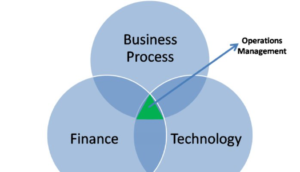In Operations Part 1, we started by covering policy, process, and procedure. We defined them and touched on why they are an integral part of your business. Then in Operations Part 2, we switched gears to talk about what to look for and how to manage the operation and its processes effectively and efficiently. So Operations Part 3 will cover operations management education, and why it has become very important in today’s world.
For companies to work efficiently and have profitably and sustainability, able managers are required who have in-depth knowledge of management as well as consummate managerial skills combined with the wisdom to apply them. This blog will illustrate what operations management is and the basics you need to know about it.

What is Operations Management?
Operations management refers to the administration of business practices to create the highest level of efficiency possible within an organization. So in a business setting, it is converting materials and labor into goods and services as efficiently as possible to maximize the profit of an organization. Management teams attempt to balance costs with revenue to achieve the highest net operating profit possible.
Specific Responsibilities of Operations Management
Operations management handles various strategic issues such as determining the size of manufacturing plants and project management methods and implementing the structure of information technology networks. However there are other operational issues to attend to. These include the management of inventory levels, including work-in-process levels and raw materials acquisition, quality control, materials handling, and maintenance policies. It entails studying the use of raw materials and ensuring minimal waste occurs. Managers utilize numerous formulas such as the economic order quantity formula to determine when and how large of an inventory order to process and how much inventory to hold on hand.
Supply Chains and Logistics
A critical function of business management relates to the management of inventory through the supply chain. It means understanding local and global trends, customer demand and the available resources for production. Operations management approaches the acquisition of materials and use of labor in a timely, cost-effective manner to deliver customer expectations. Inventory levels are monitored to ensure appropriate quantities are on hand. It is responsible for finding vendors that supply the appropriate goods at reasonable prices and have the ability to deliver the product when needed.
Delivery Management
Another large facet of operations management involves the delivery of goods to customers. This includes ensuring products are delivered within the agreed time commitment. For example, if you order something online and they promise a 3-day delivery, the company must manage the inventory and shipping method to ensure that the customer receives their order within that 3-day window. It also typically follows up with customers to ensure the products meet quality and functionality needs. A customer might receive a survey through email or the company might evaluate their online reviews. Finally, operations management takes the feedback received and distributes the relevant information to each department to use in process improvement.

Ideal Traits of Operations Managers
Operations management’s emphasis is on the efficiency of the business’ processes and procedures. As such, management on an operation depends on measurement and analysis of those processes and procedures. Such as cutting costs through effective utilization of inventory. To analyze the company’s inventory utilization, managers will calculate the inventory turnover ratio to see how well they are doing, compare the ratio to prior inventory turnover ratios and then make decisions to improve that ratio.
An individual working in business management must have an understanding of the various processes within a company. Operations managers are involved in coordinating and developing new processes while reevaluating current structures. Organization and productivity are two key drivers of being an operations manager, and the work often requires versatility from the operations manager.
Information sourced from:
- https://en.wikipedia.org/wiki/Operations_management
- http://www.topmba.com/mba-programs/what-operations-management
- https://hbr.org/topic/operations-management
- http://mitsloan.mit.edu/omg/om-definition.php
- http://www.businessdictionary.com/definition/operations-management.html
- http://managementhelp.org/operationsmanagement/
- http://www.investopedia.com/terms/o/operations-management.asp



